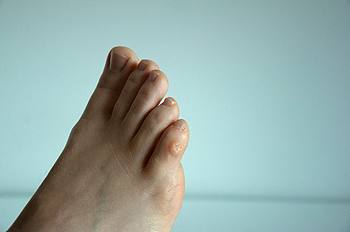
A corn that develops on the foot can produce severe pain and discomfort. It happens as a result of excessive pressure that is put on a specific part of the foot from the worn shoes. The places where corns can develop are on the side of the pinky toe, the soles of the feet, or on top of the toes. Many people choose to wear shoes that are too tight because of workplace policies or for appearance reasons, and this may be why corns can develop. Patients who have corns that are not treated or removed may notice their gait or walking style is compromised, which is a defense mechanism against the pain. Mild relief may be found when the foot is soaked in warm water, and a pumice stone is used which may reduce the size of the corn. This is generally a temporary fix and the corn may reappear if not treated permanently. If you are afflicted with a corn, it is strongly suggested that you speak to a podiatrist who can offer you several treatment options.
If you have any concerns regarding your feet and ankles, contact Renee Rodriquez, DPM of Foot Clinic of South Texas. Our doctor will treat your foot and ankle needs.
Corns: What Are They? and How Do You Get Rid of Them?
Corns can be described as areas of the skin that have thickened to the point of becoming painful or irritating. They are often layers and layers of the skin that have become dry and rough, and are normally smaller than calluses.
Ways to Prevent Corns
There are many ways to get rid of painful corns such as wearing:
- Well-fitting socks
- Comfortable shoes that are not tight around your foot
- Shoes that offer support
Treating Corns
Treatment of corns involves removing the dead skin that has built up in the specific area of the foot. Consult with Our doctor to determine the best treatment option for your case of corns.
If you have any questions please feel free to contact our office located in Brownsville, TX . We offer the newest diagnostic and treatment technologies for all your foot and ankle needs.
